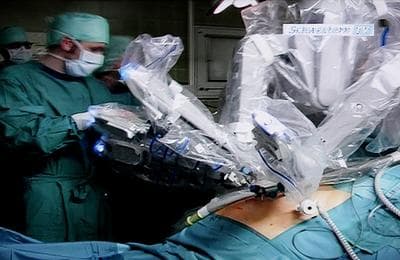Advertisement
Robotic-Assisted Hysterectomy Costs More, But No Better, Study Finds
Robotic-assisted surgery is all the rage — it's up about 400 percent in the last few years, according to one estimate.
Robotic hysterectomies are also on the rise: in the U.S. thousands of women undergo hysterectomies for various gynecological disorders and many of these are performed using minimally invasive techniques, including laparoscopy and with the help of a surgical robot.
But a new study from the Journal of the American Medical Association that compared robotic and laparoscopic hysterectomies among more than 264,000 women with non-cancerous gynecologic conditions found that there was no difference in complication rates or outcomes. The big difference was cost: the robotic hysterectomy was, on average, about $2,200 more, the study found. The JAMA report notes that robotic hysterectomies took off in recent years, up from 0.5% in 2007 to 9.5% by 2010.
The JAMA report notes that robotic hysterectomies took off in recent years, up from 0.5% in 2007 to 9.5% by 2010.
One driver is likely the intense marketing of surgical robots by its manufacturers. A 2011 study out of Johns Hopkins found that hospitals are misleading patients about the benefits of robotic surgery and that hospital websites routinely use industry-provided content and overstate claims of robotic success.
Here's more on the JAMA report from USA Today:
As use of robots rose, the use of traditional large-incision surgeries fell, says lead author Jason Wright, assistant clinical professor of gynecologic oncology at Columbia University College of Physicians and Surgeons, New York. Those traditional surgeries are known to have higher risks for most women than the other techniques. But, at hospitals with robots, the use of small-incision laparoscopic surgeries done by hand also fell, Wright says.
He and his colleagues looked at outcomes and found immediate complication rates for robotic and laparoscopic surgeries were the same, about 5%. But, largely due to upfront equipment costs, each robot surgery cost nearly $2,200 more — a median of $8,868 vs. $6,679. Though insurers and patients don't directly pay this difference, "we have to weigh the societal benefits," of that health care investment, Wright says.
The money spent on robots might be better spent on training more surgeons in basic laparoscopic techniques, says an accompanying editorial written by researchers from Brigham and Women's Hospital, Boston. While robot surgery has some appropriate uses and may yet prove superior for some hysterectomy patients, right now "we've got two options that give you the same outcome," says editorial co-author Joel Weissman, a health policy expert. "One costs a lot more."
This program aired on February 20, 2013. The audio for this program is not available.
